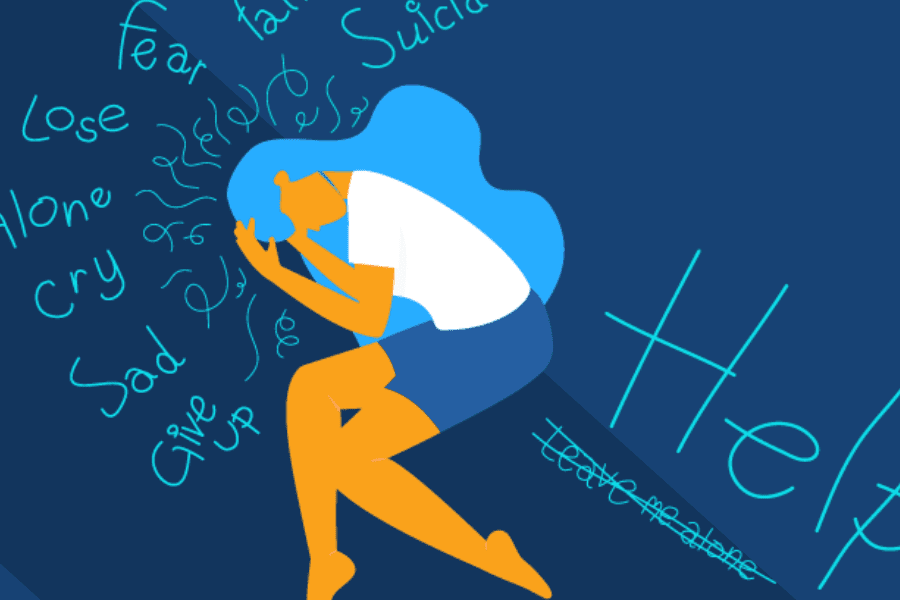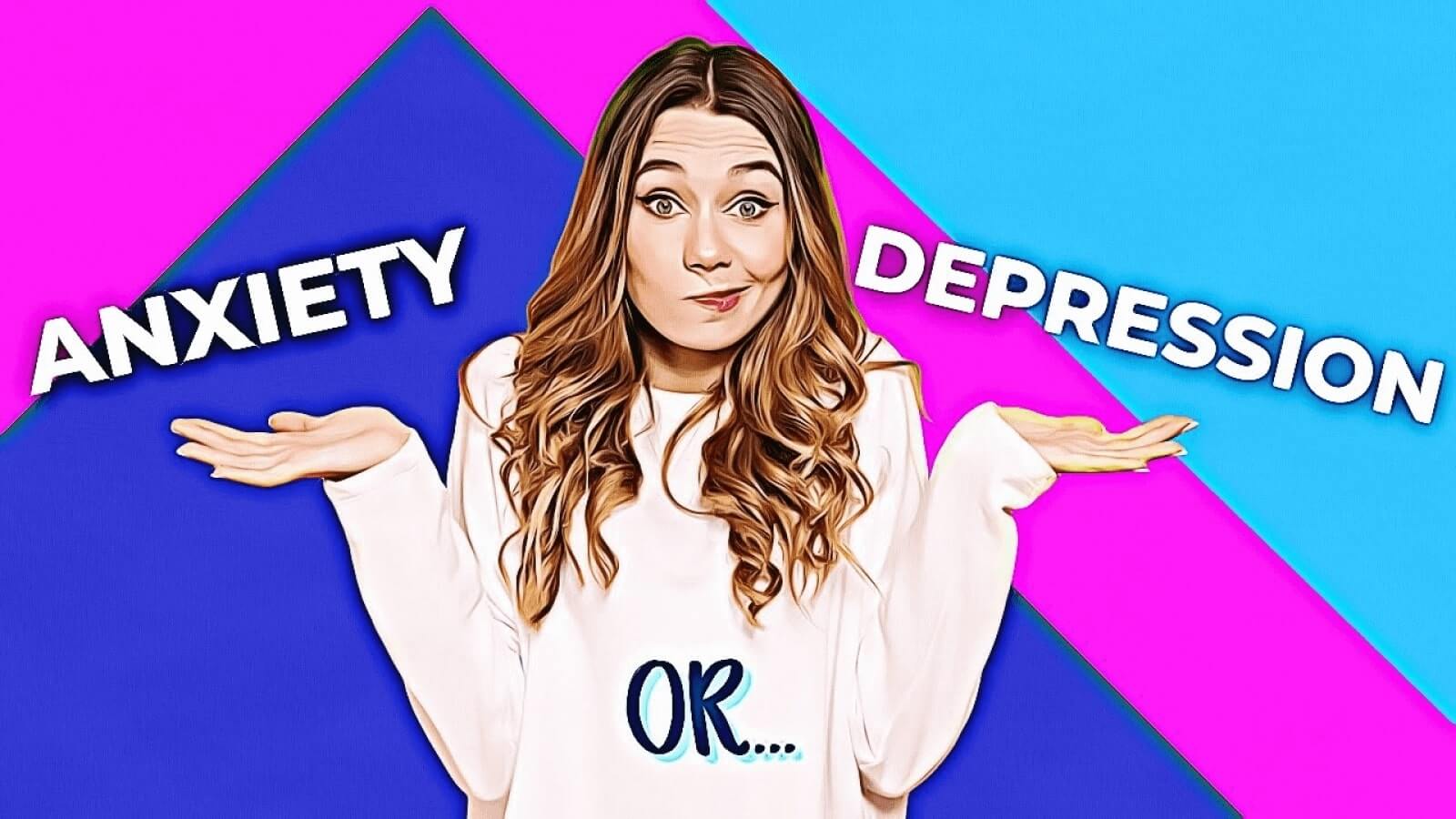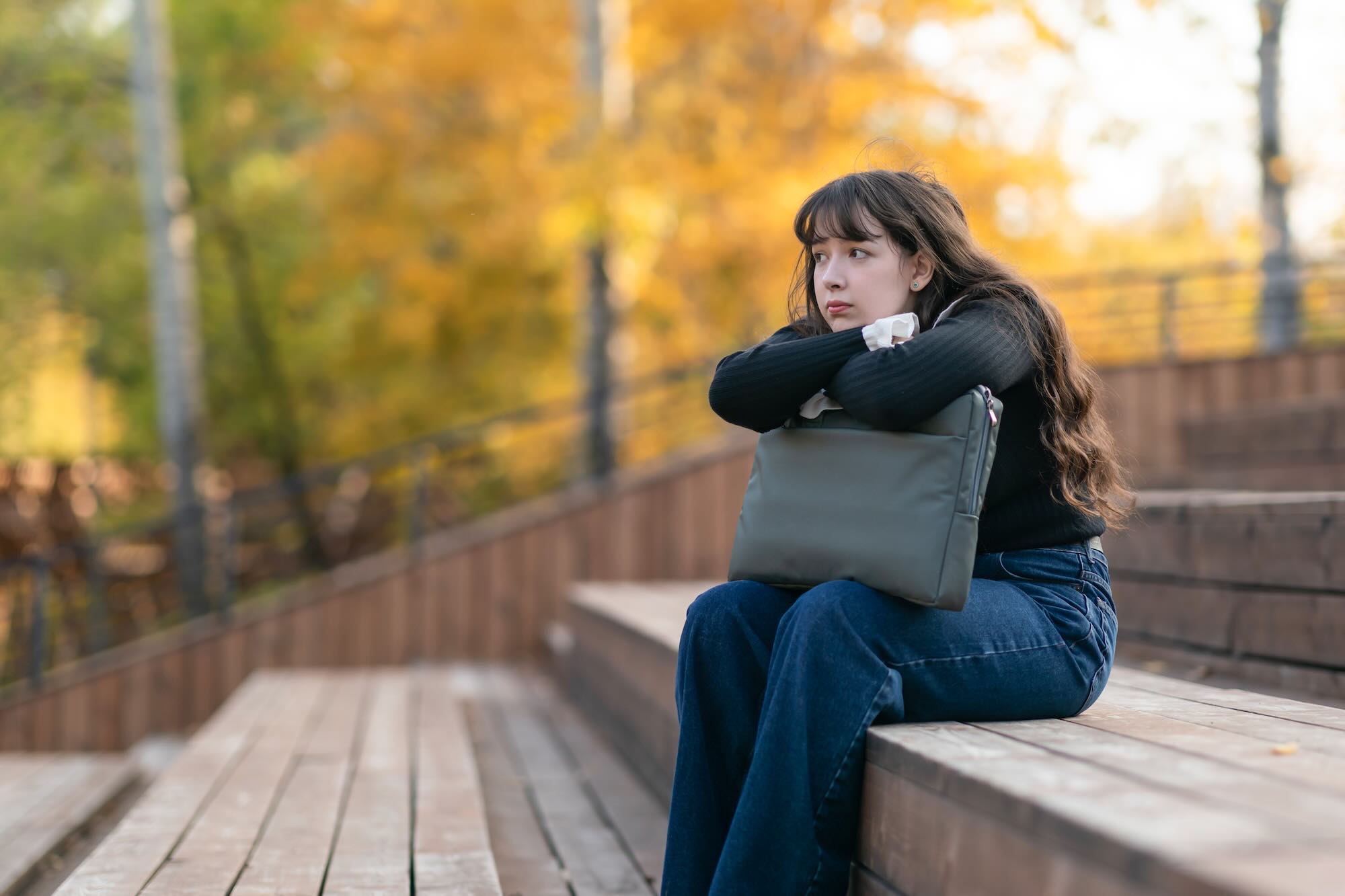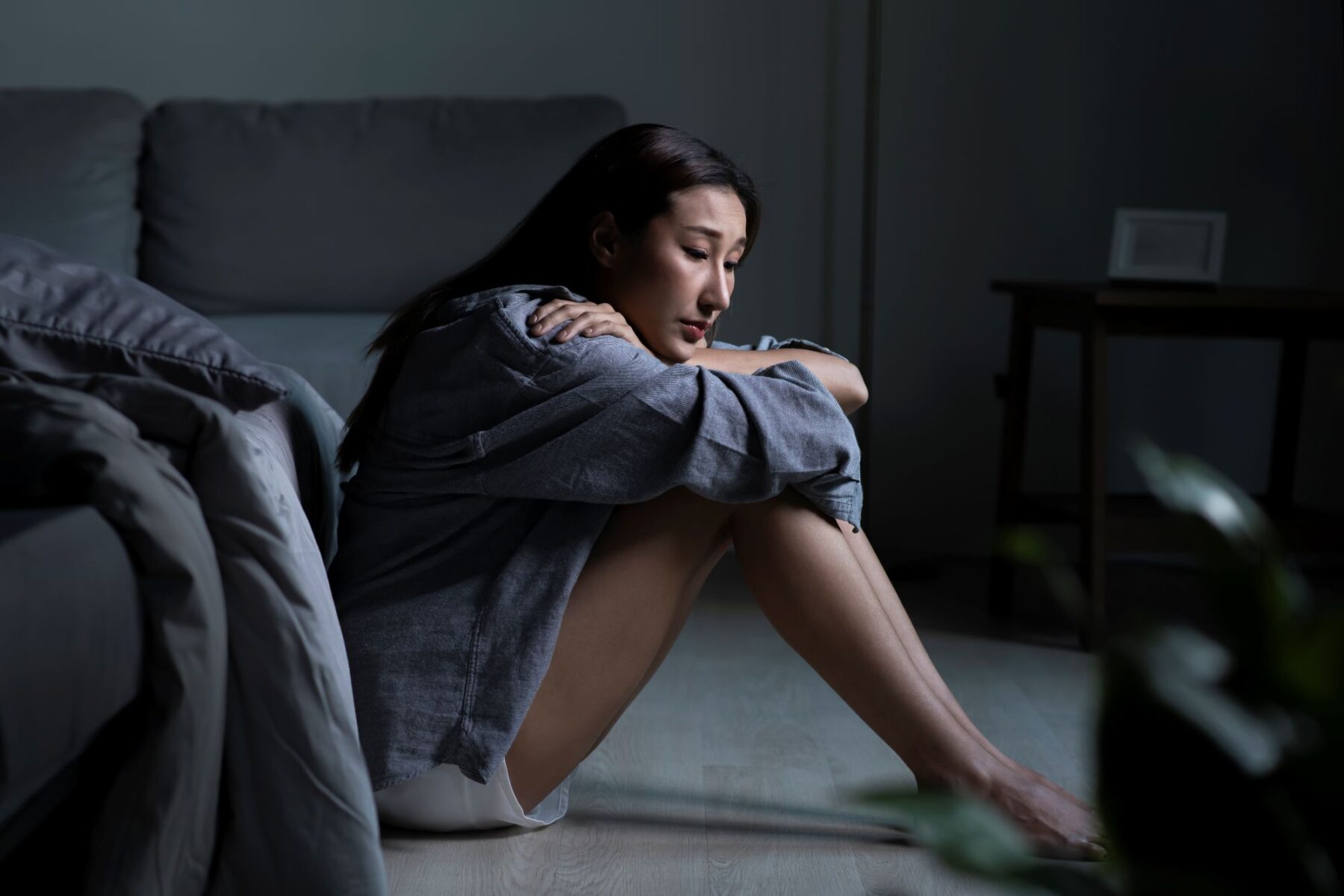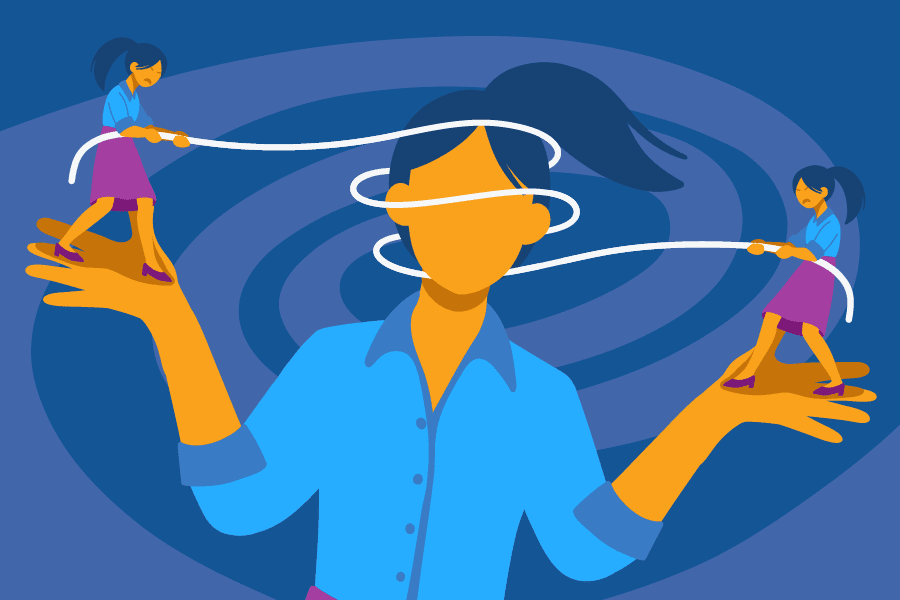Anxiety and Depression Together
What Are Depression And Anxiety Called Together?
While depression and anxiety commonly occur separately, they can also be found together.
Mixed anxiety and depressive disorder (MADD) is a mental health condition where individuals experience symptoms of both anxiety and depression without either being clearly dominant.
MADD is diagnosed by a set of criteria where the following symptoms are reoccurring, last for four weeks or more, and are not a result of other factors like medication or mental health disorders:
- Sadness and dissatisfaction
- Concentration and memory issues
- Sleep disruption
- Lack of energy
- Irritability and worrying
- Crying or getting upset easily
- Peccimism or hopelessness
- Low self-esteem
- Enhanced sensory sensitivity
If a person has four or more of these symptoms without being diagnosed with another mental health condition, they might have MADD. However, working with a healthcare professional is the best way for someone to get a diagnosis.
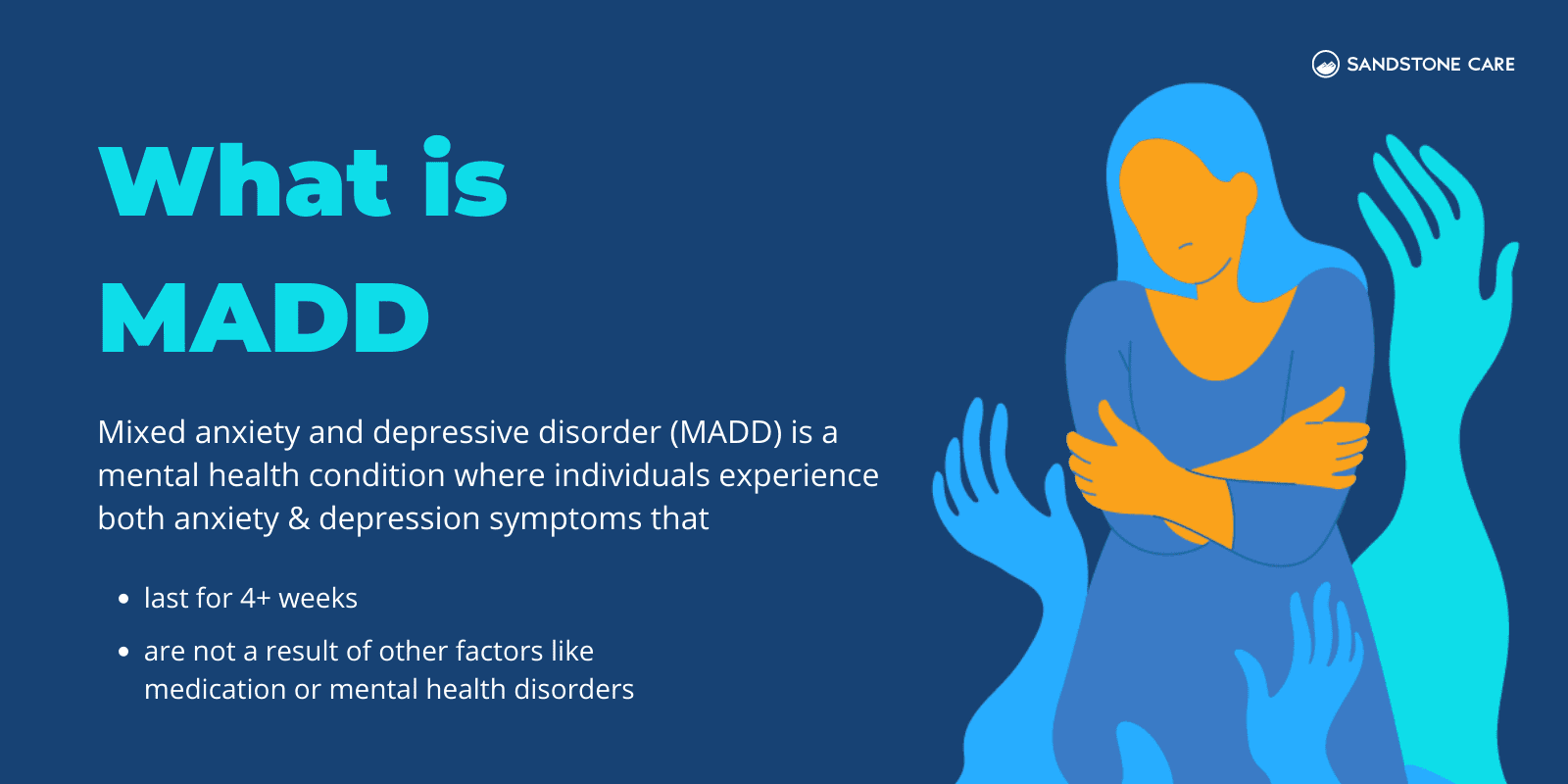
Why Are Anxiety and Depression Often Co-occurring?
Anxiety and depression are often co-occurring for multiple reasons. They are believed to be two extremes of one condition and a cycle.
A person with anxiety often has feelings of worry or concern about things they cannot control in the past, present, and future. These feelings are uncontrollable for someone with anxiety.
These uncontrollable feelings of worry and lack of focus often lead to feelings of failure. Feelings of lack of worth or value are common symptoms of depression; therefore, anxiety can lead to depression.
However, depression can also lead to anxiety. Depression symptoms include anger, irritability, and lack of energy. When a person is struggling with depression, these symptoms cause them to be unable to function regularly. This leads to anxiety, and as a result, it is common for those with depression to experience symptoms like panic attacks.
Therefore, as a cycle, they affect each other. If a person experiences depression, they are more likely to experience anxiety and vice versa.
What is Depression Anxiety Considered?
Depression anxiety is a mental health disorder. It is a diagnosis used for people experiencing symptoms who do not fit into one diagnosis of only anxiety or depression.
A person experiencing depression anxiety can have many different types of anxiety and depression if their symptoms fit into the diagnostic criteria. However, the combination of the two classifies it as depression anxiety.
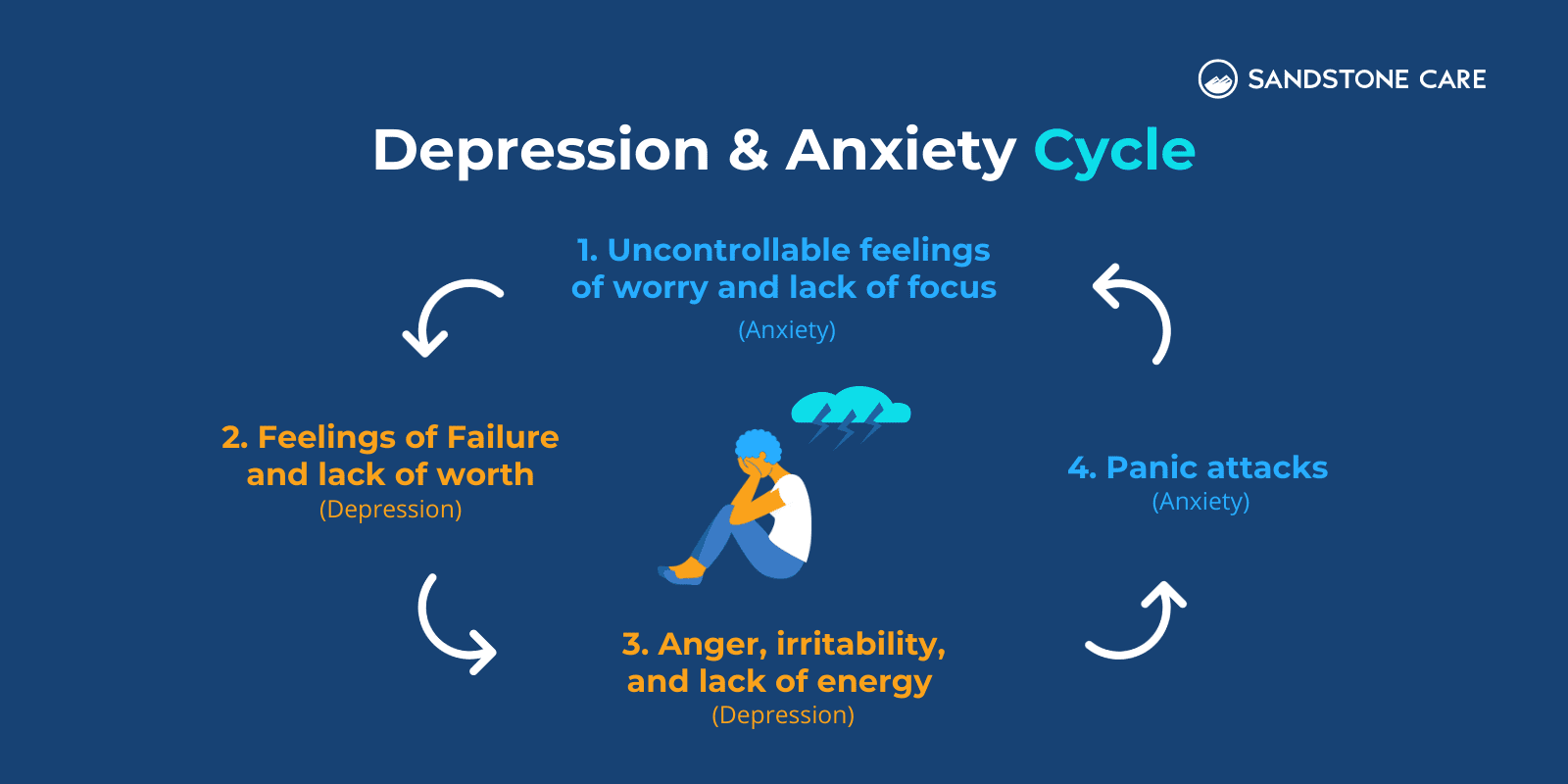
What Are The Similarities Between Depression And Anxiety?
Depression and anxiety are both types of mental illness.
As a result of impacting mental health, both impact a person’s well-being. This includes disrupting sleep, causing fatigue, and other physical symptoms like pain. People with anxiety and depression that is untreated often struggle with functioning in daily life.
Both depression and anxiety also impact a person’s mood and cause feelings of hopelessness and low self-esteem. They also commonly cause irritability and a lack of interest in activities that they enjoyed in the past.
The symptoms of depression and anxiety often look very similar. Additionally, both impact the brain. However, the type of anxiety and depression do cause unique changes in the brain.
Depression and anxiety are also similar in that many people reach for drugs and alcohol as a way to feel better. In the short term, substances might make a person able to function again. However, substance use makes symptoms of both anxiety and depression worsen over time.
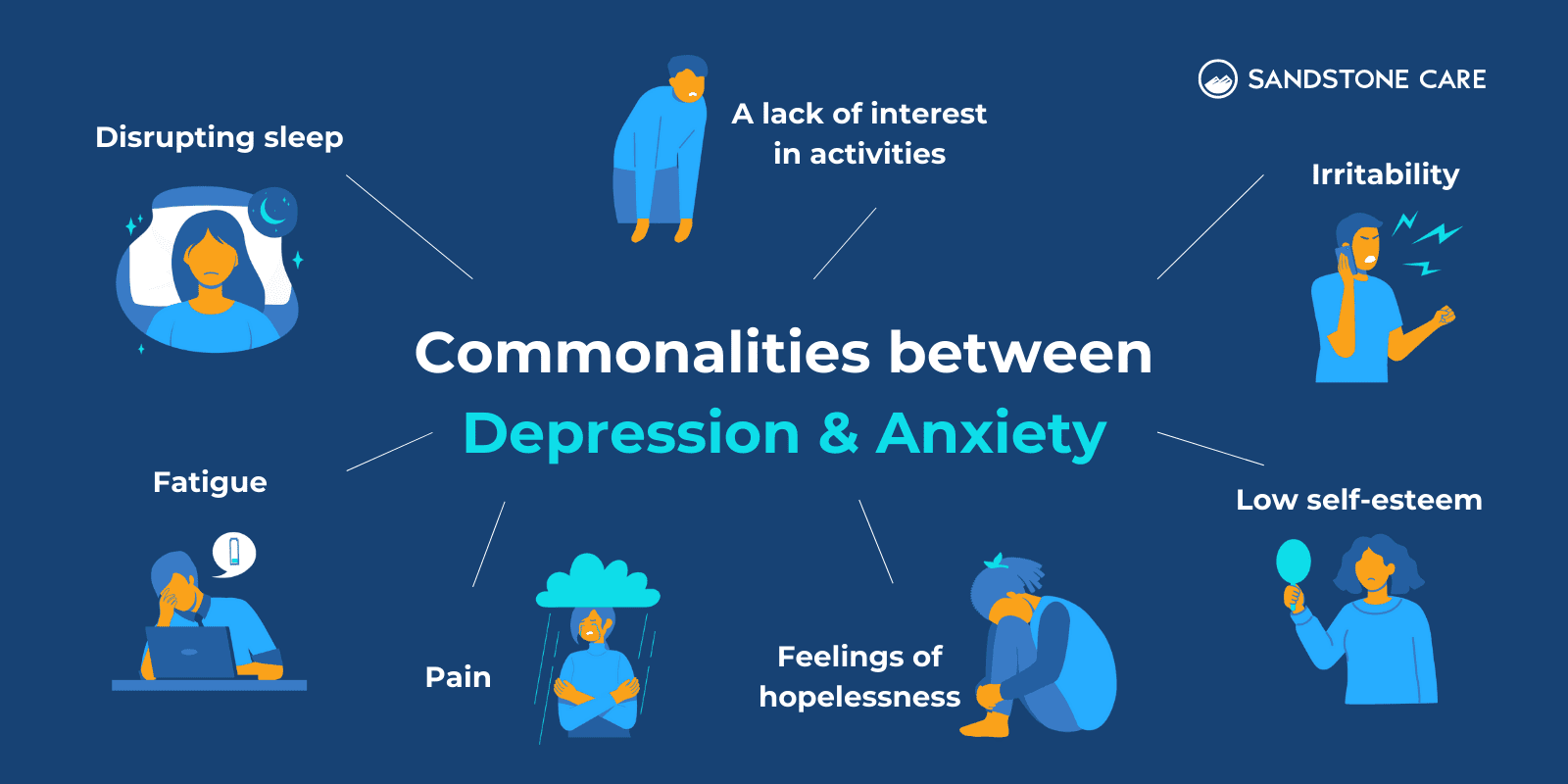
What Is The Difference Between Depression And Anxiety?
People struggling with depression experience feelings of sadness, excessive guilt or shame, and worthlessness.
Additionally, depression causes changes in appetite and thoughts about or associated with suicide. Many individuals idolize suicide, believing it to be the best and only option.
However, anxiety tends to cause symptoms like excessive worry, restlessness, and generally feeling on edge. The sensation is much like being nervous or scared, but for people with anxiety, these feelings are uncontrollable and do not go away after the danger has passed.
Anxiety also creates unwanted thoughts that consistently reappear, a lack of ability to concentrate, and an inability to stop feeling worried or concerned. This might look like analyzing a situation in the past over and over.
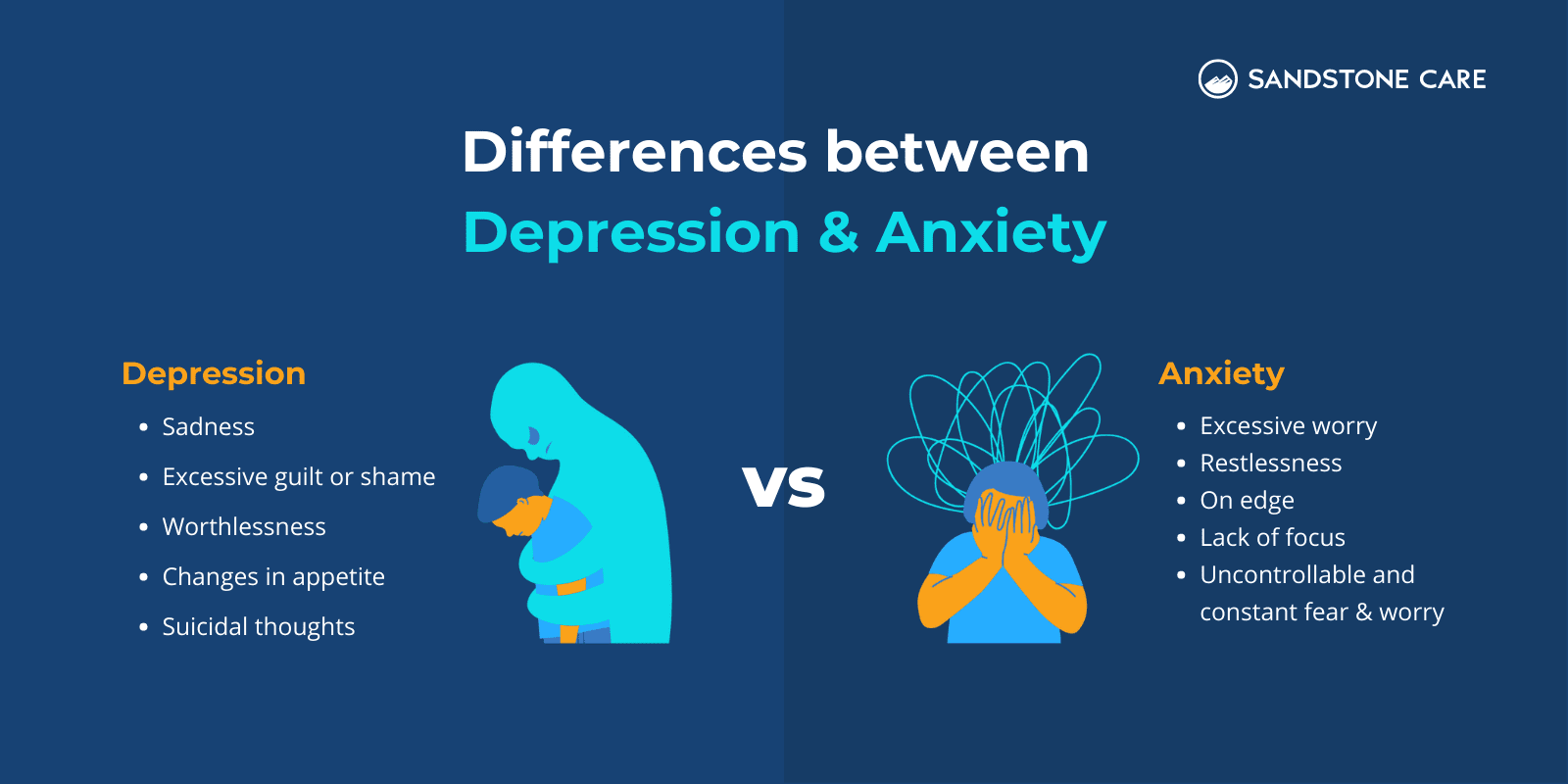
What Are The Main Causes Of Anxiety And Depression?
Anxiety and depression can be caused by many factors.
A history of trauma, including childhood trauma or traumatic event experienced as an adult, can put people at a higher risk for anxiety and depression. People who have post-traumatic stress disorder (PTSD) often also struggle with anxiety and depression.
Having one or more family members with anxiety or depression can also contribute to the risk of experiencing anxiety and depression. However, a person’s environment also impacts anxiety and depression. This means that a person with a family history of anxiety and depression will not necessarily struggle with them.
Substance abuse can also play a role and can be from anxiety and depression or cause anxiety and depression. While many people struggling with anxiety or depression will reach for drugs or alcohol to feel better, it increases symptoms of both anxiety and depression long term. Substance abuse over time can also increase a person’s likelihood of anxiety or depression.
A person’s lifestyle also contributes to their mental health. A person who experiences high levels of stress and a lack of self-care puts people at a higher risk for anxiety and depression. This often includes a lack of exercise, little to no sleep, and poor nutrition. Therefore, lifestyle changes are commonly helpful in healing from these mental health conditions.
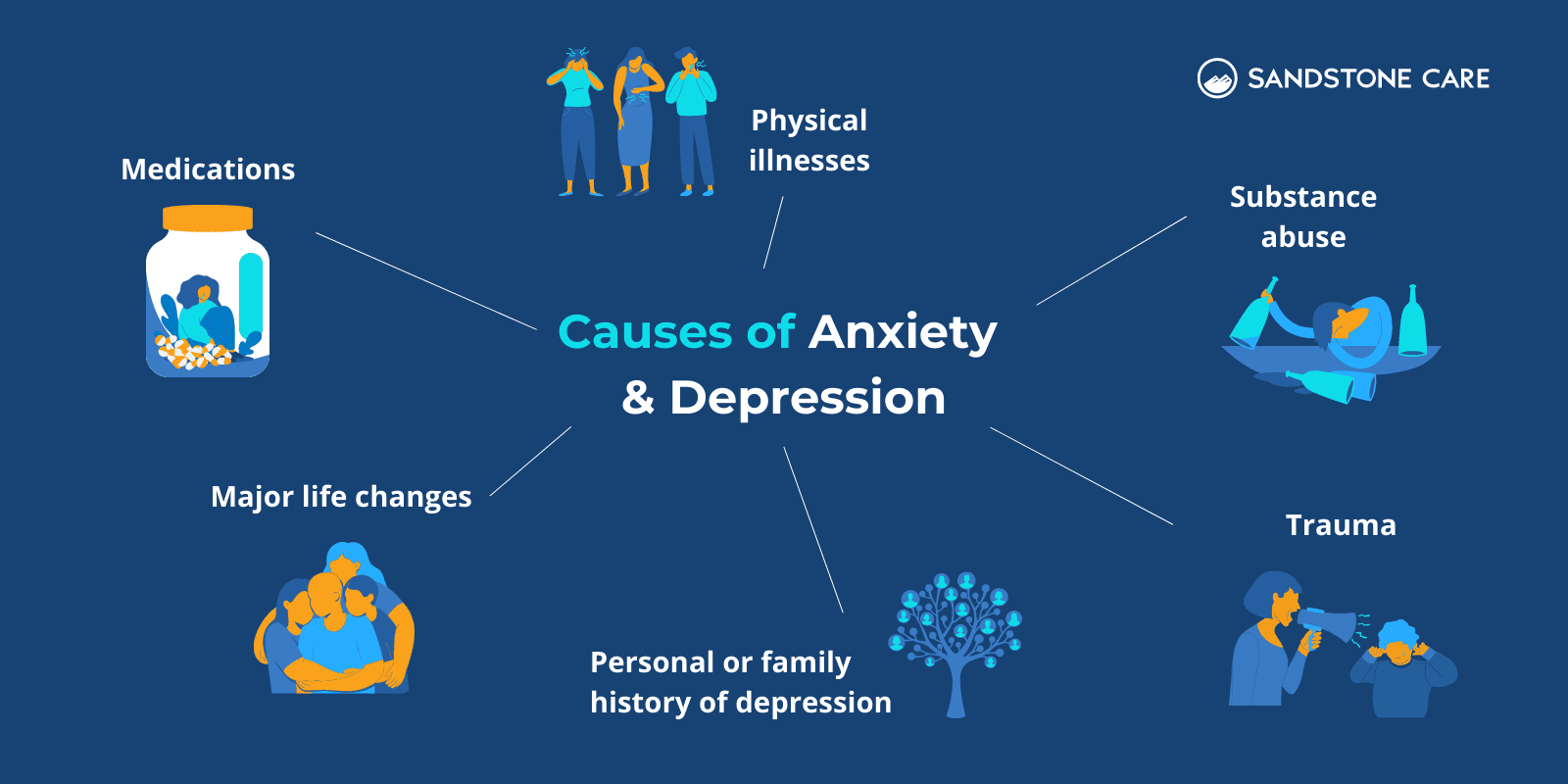
Symptoms of Depression Anxiety
What Are The Overlapping Symptoms Of Anxiety Disorder And Depression?
According to the Diagnostic and Statistical Manual of Mental Disorders (DSM), symptoms of an anxiety disorder include irritability, being easily fatigued, and lack of focus. Depression which is also called major depressive disorder, shares these symptoms.
How Do People With Anxiety And Depression Behave?
Every person with anxiety or depression experiences unique symptoms and behaviors.
However, people with anxiety and depression are often tired and cranky, and others will notice their mood change over time toward more negative emotions.
They commonly stop being interested in activities or relationships they previously seemed to enjoy, such as physical activity. This can cause people to spend more time doing less engaging activities like walking television.
Feelings of sadness or negative feelings about themselves are also common for both anxiety and depression. These feelings can make people seem unsure of themselves due to their loss of self-esteem. These feelings will appear different for each individual. Some people might be more irritated, while others may express self-doubt directly.
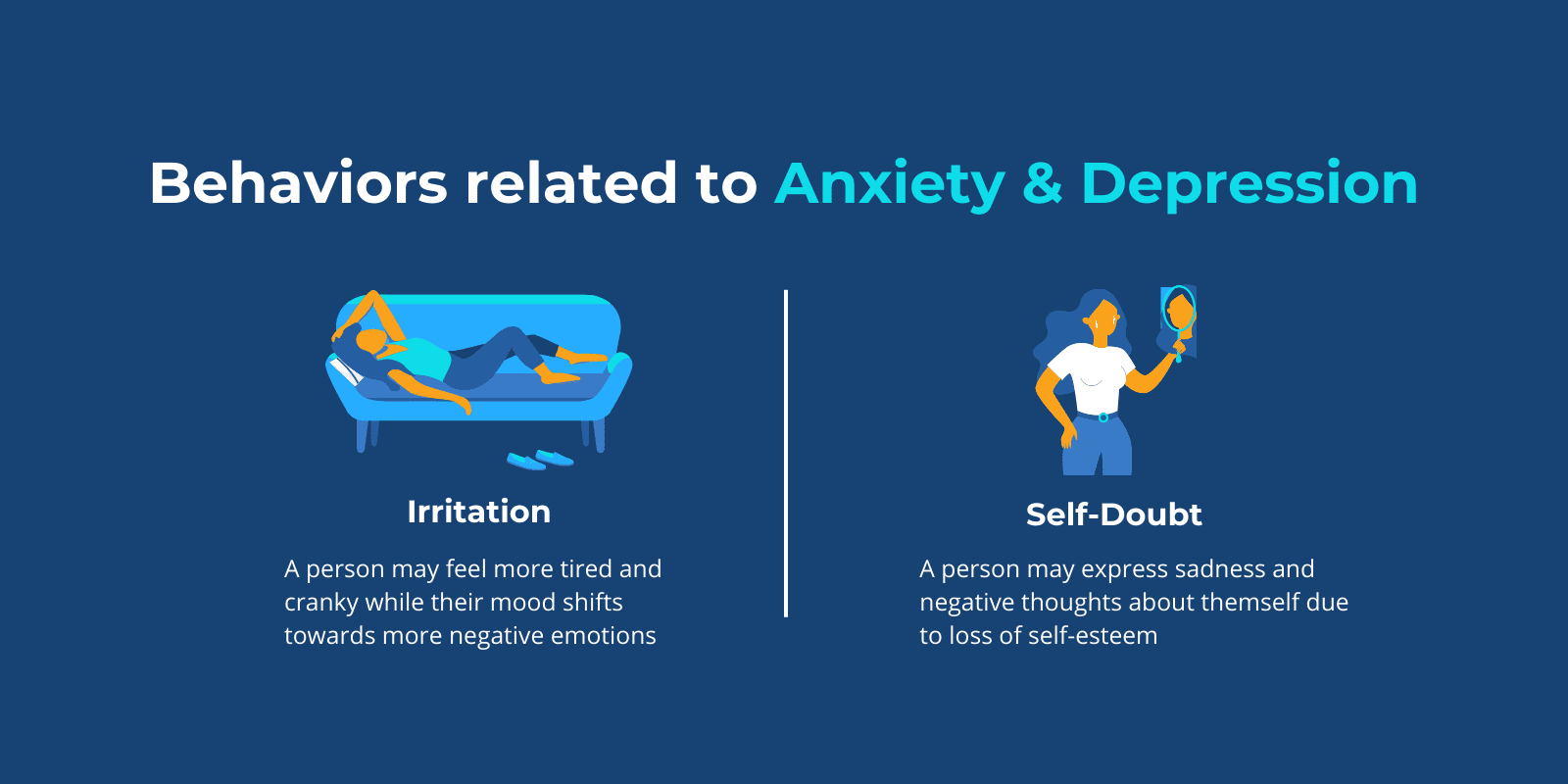
What Are The Early Signs Of Depression And Anxiety?
Early signs of anxiety disorders are feelings of being on edge without being able to relax.
They also often include feeling worried and concerned about the past, present, or future. Again, these feelings of worry feel uncontrollable.
People developing major depression will experience symptoms like emptiness or sadness that are continuous. These feelings begin to impact their choices early on. For example, a common reaction is to stop participating or engaging in their lives, including activities and relationships.
What Do Depression And Anxiety Do To The Brain?
The type of anxiety and depression makes a difference in how the brain is affected.
However, depression and anxiety impact parts of the brain that regulate emotions. This includes the amygdala, hippocampus, and dorsomedial thalamus. Depression and anxiety cause parts of the brain to shrink while others will become more active.
Researchers have found that these emotional parts of the brain are abnormal in people with anxiety and depression. This creates an imbalance in the brain. More research is needed to understand if any of these changes create depression and anxiety or if they are merely a result of depression and anxiety.
Neurotransmitters like serotonin are also altered in anxiety and depression.
As a result, antidepressants like selective serotonin reuptake inhibitors (SSRIs) are used to treat anxiety and depression.
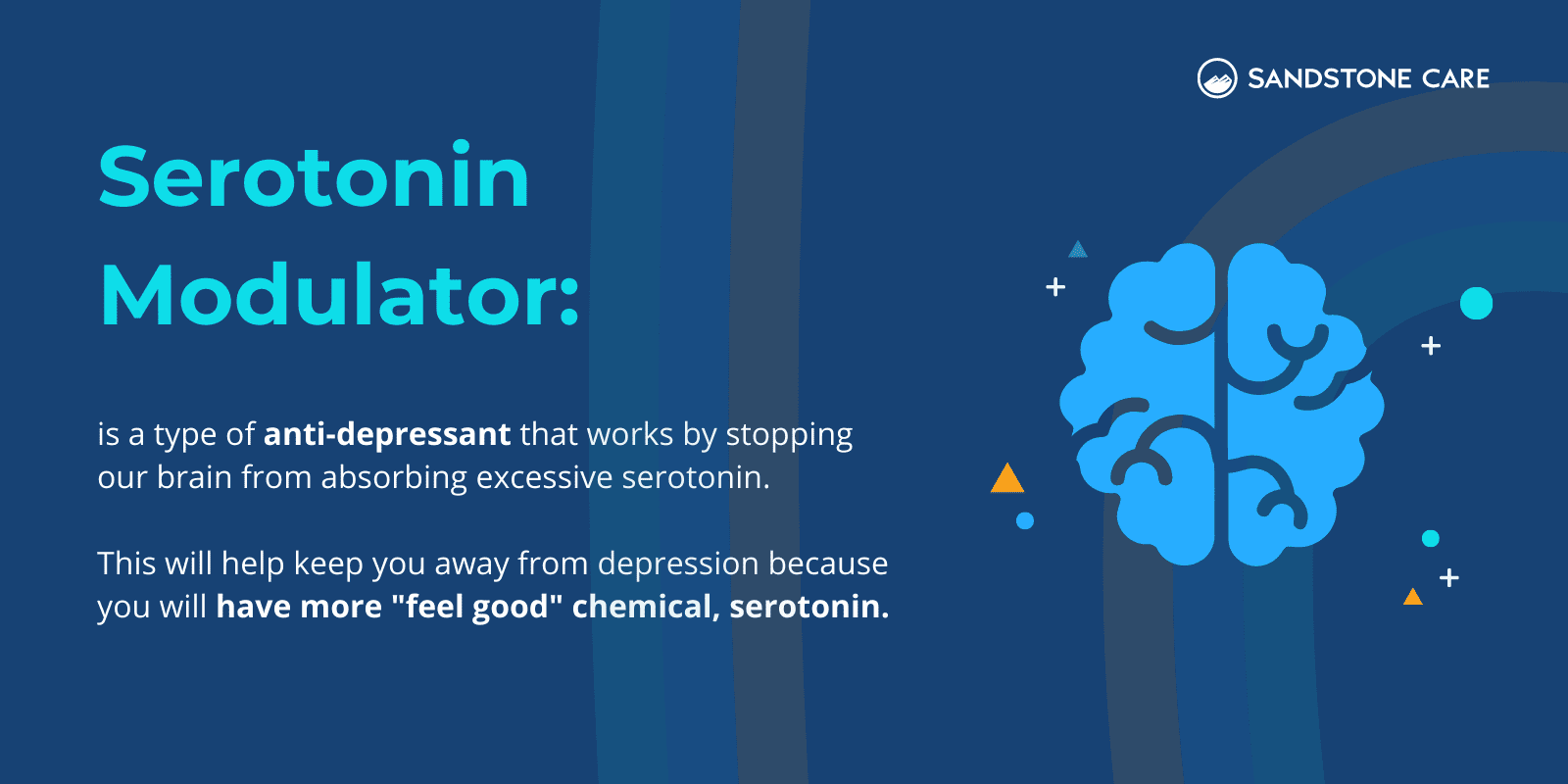
Diagnosis & Treatment for Anxiety and Depression
Can You Get Tested For Anxiety And Depression?
People who are experiencing symptoms can get tested for anxiety and depression. Working with a healthcare professional is ideal for getting tested.
How Do Doctors Test For Anxiety And Depression?
Testing for anxiety and depression includes a physical exam and questions about a person’s symptoms.
Symptoms are communicated directly to a healthcare professional or through diagnostic questionnaires. The best way for a person to be correctly diagnosed is to be as honest as possible with symptoms.
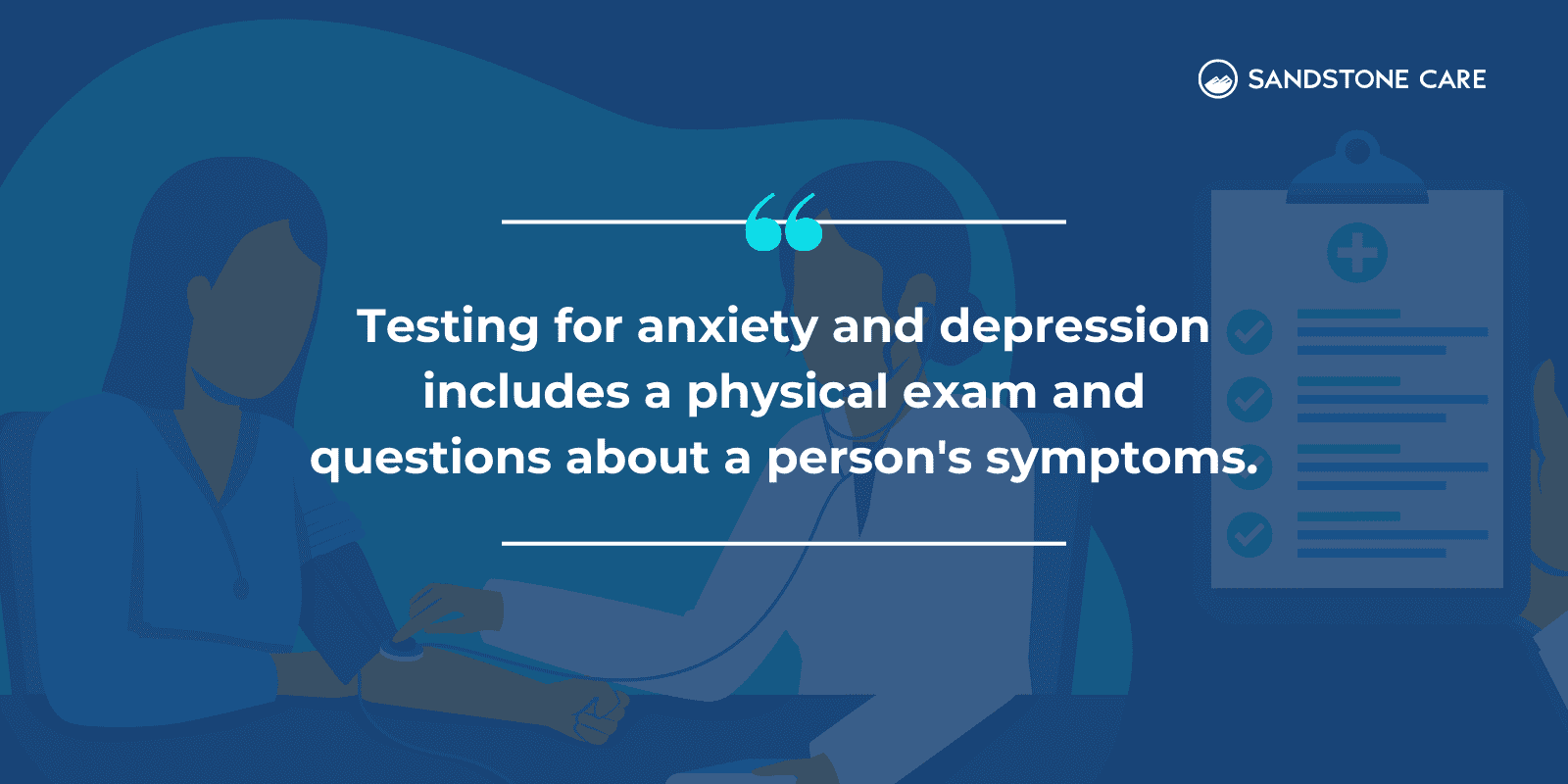
How Are Anxiety And Depression Treated?
Anxiety and depression are treated with antidepressant medication such as SSRIs. They are also treated by learning self-help tools, including relaxation techniques, breathing exercises, and physical activity.
By working with mental health care providers, people struggling with anxiety and depression will have access to therapies like psychotherapy or cognitive-behavioral therapy (CBT) which are also commonly used to treat anxiety and depression.
Often therapy includes learning new behaviors that help people to feel better. This might look like learning to manage stress, improving health habits, or creating a healthy sleep routine. These lifestyle modifications help people to stabilize their mood and improve daily functioning.
Can You Treat Depression And Anxiety The Same Way?
Yes, SSRIs are used to treat both depression and anxiety.
Therapy to help make changes to a person’s behavior can also be used to improve symptoms for both. The first line of defense for both anxiety and depression is medication and therapy. While the specifics will be unique to each person, the method of treatment is similar.
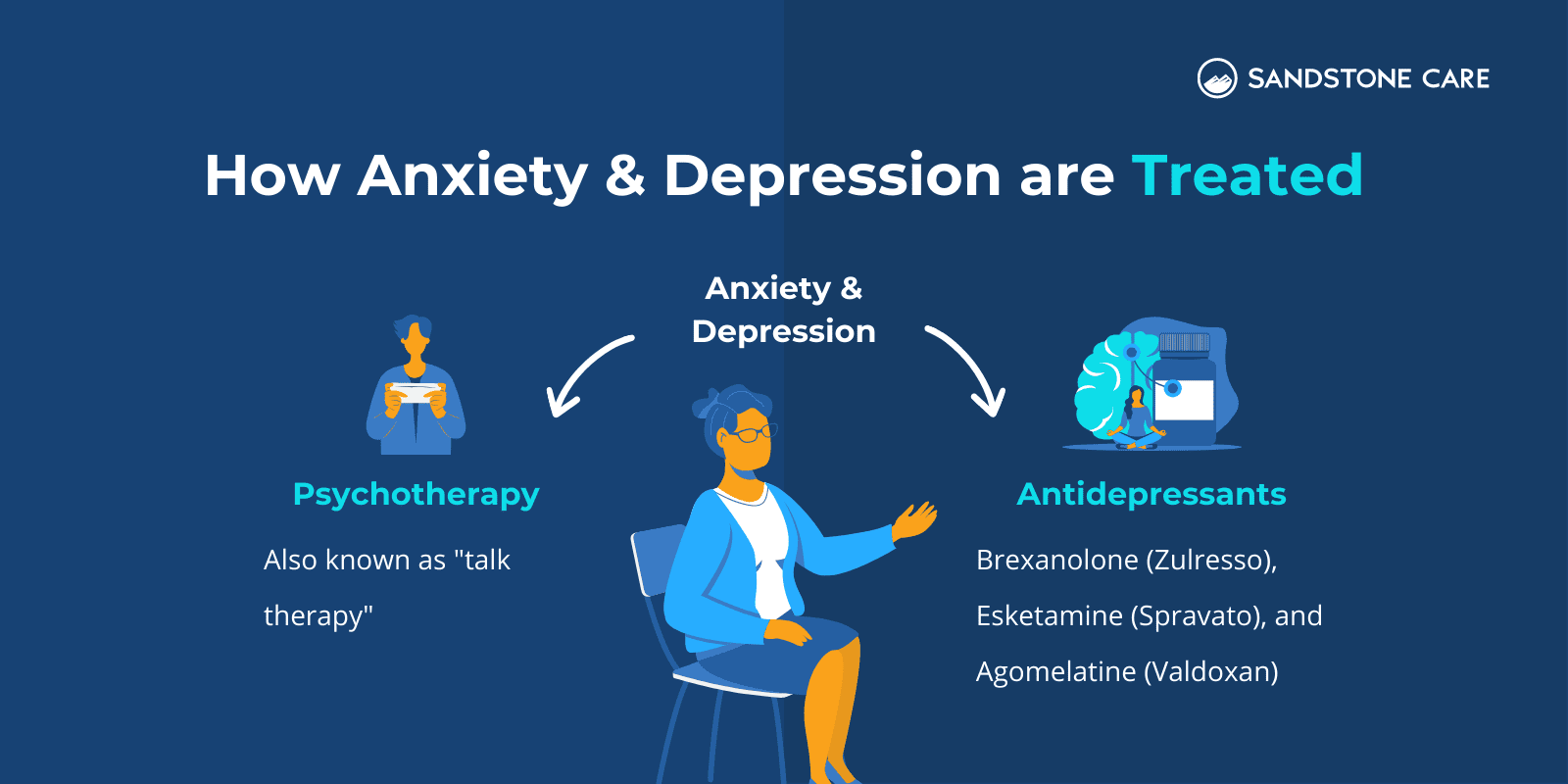
What Is The Best Treatment For Anxiety And Depression?
Treatment for every person will look different. However, the best treatment is one that addresses each person’s unique needs, which often includes medication and behavioral modifications.
What Are The Positive Effects Of Treating Anxiety And Depression?
Getting treatment for anxiety and depression is very positive in a person’s life.
It helps people to feel better daily, engage in life and activities they enjoy and build healthy and sustainable relationships with loved ones. This helps people to feel more connected and in control of their lives.
Through treatment, people find a healthy balance in their lives. They can return to activities they enjoy and feel more like themselves. The effects of treatment are seen in almost every aspect of a person’s life. It helps improve overall well-being.
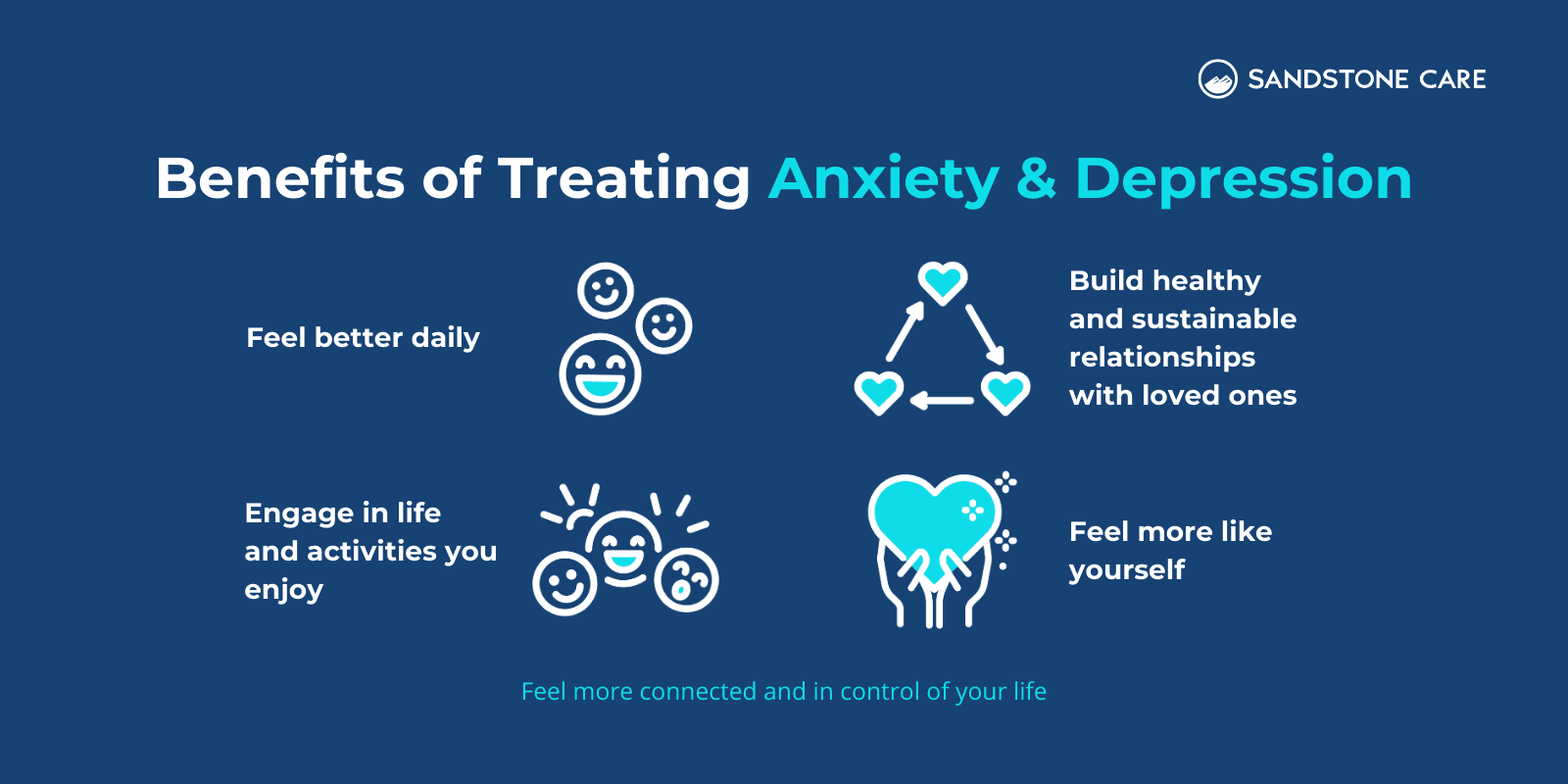
8 Coping Skills For Anxiety and Depression
-
Meditation and relaxation techniques:
coping with depression and anxiety means managing symptoms. Symptoms for different types of anxiety and depression will vary. However, learning to relax and meditate is one way to feel calm, improve sleep, and help people to focus.
-
Exercise:
Taking care of physical health is an important coping skill for mental health. Regular exercise is very important and a healthy coping skill for people with depression and anxiety. Activities like taking a walk, attending an exercise class, or joining a community team are all great options to make exercise a regular part of a person’s life.
-
Journaling:
For people struggling with depression and anxiety, improving self-awareness will help to manage symptoms. Keeping a journal helps improve self-awareness. It can also be a way to release emotions in a safe space.
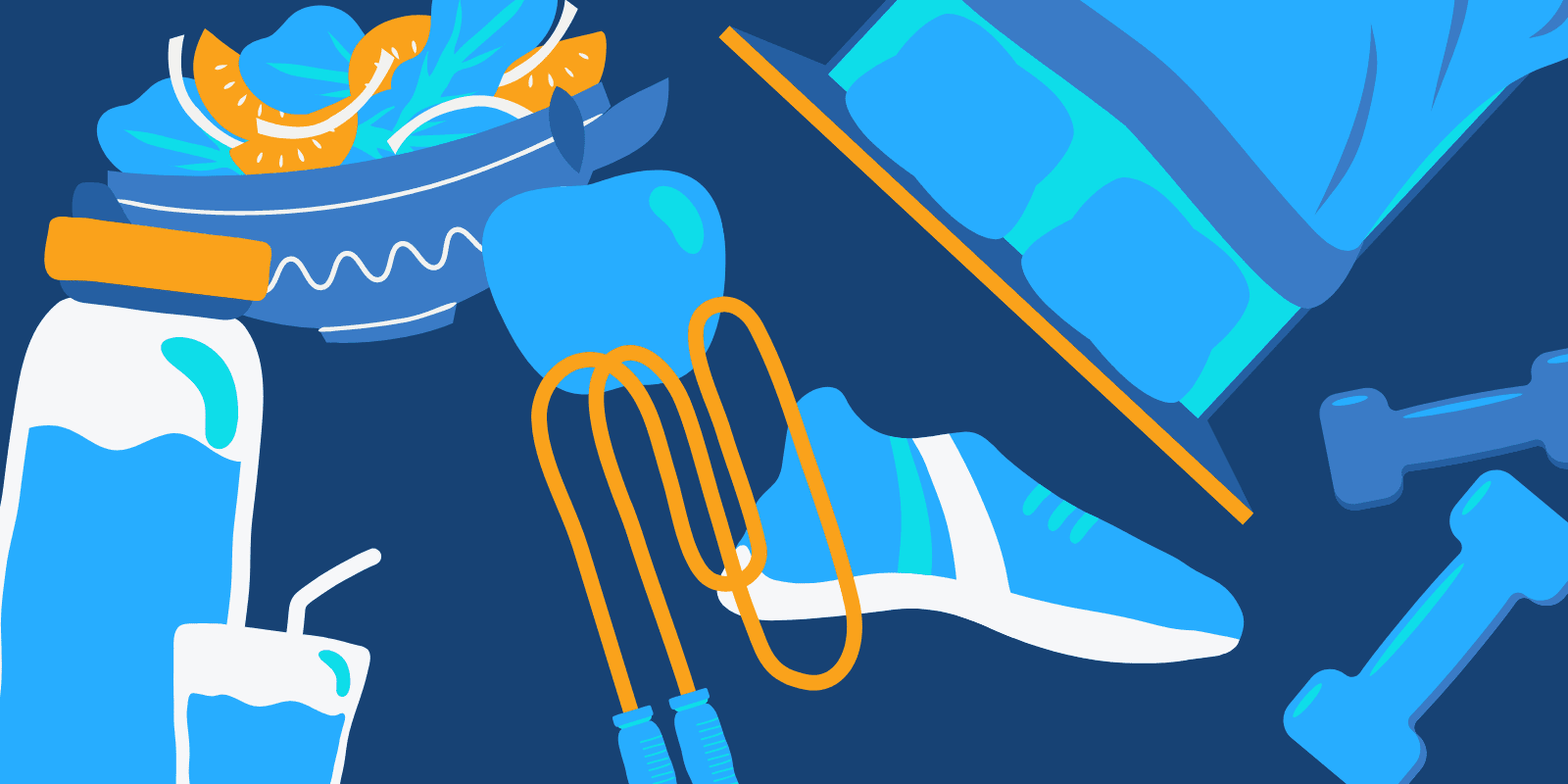
-
Connecting with loved ones:
When a person has a community they can lean on, they are more able to cope with challenges. For people struggling with anxiety and depression, talking to friends and family is a very healthy way to cope with symptoms.
-
Talking with a therapist:
Getting help from a professional helps people improve their mental health conditions. It helps them to improve coping skills, address trauma, and treat disorders like panic disorder, generalized anxiety disorder, and major depressive disorder.
-
Eating a healthy diet:
The food a person eats makes a difference in how they feel. Eating a healthy diet helps people to improve and stabilize their mood and energy.
-
Building a sleep routine:
Getting enough sleep helps people to feel better all around. People with anxiety and depression often struggle with sleep problems. Making a bedtime routine and improving sleep habits is a healthy way to improve and cope.
-
Taking medication:
Medication helps to improve anxiety and depression and is a healthy way to cope. Working with a psychiatrist helps people to get the right medication that helps manage symptoms.
Medication For Anxiety & Depression
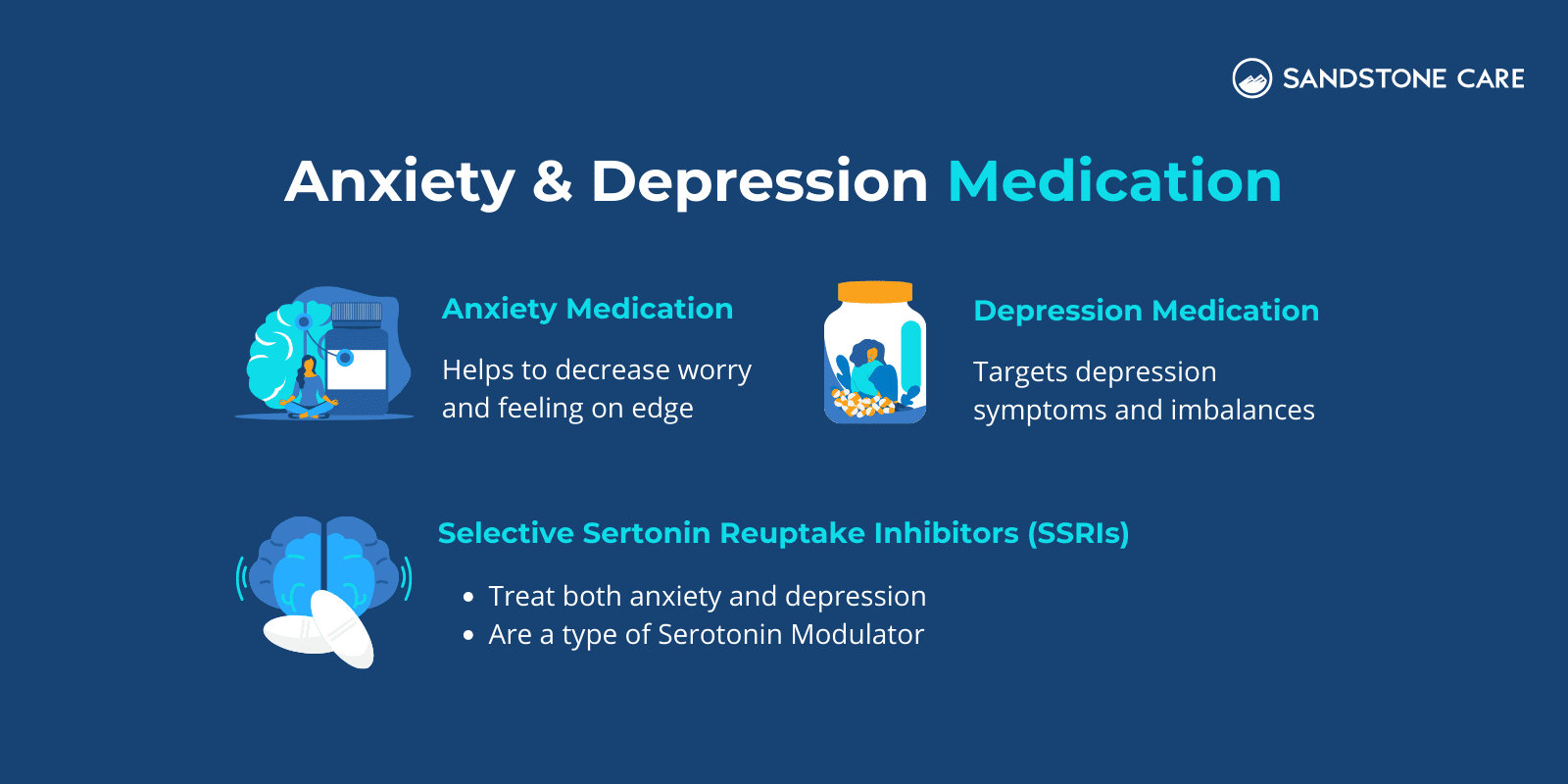
Is There A Difference Between Anxiety And Depression Medication?
There is a difference between anxiety and depression medications.
Anxiety medication helps to decrease worry and feeling on edge and, therefore, targets a part of the brain that controls this. However, medication for depression targets the symptoms found in depression and the imbalances found in depression.
Is There A Medication That Treats Both Anxiety And Depression?
SSRIs are used to treat both anxiety and depression.
What Are The Two Most Common Treatments For Anxiety And Depression?
Anxiety and depression are most commonly by medication and psychotherapy, which is commonly called talk therapy.
What Are The Newest Medications For Anxiety And Depression?
The Food and Drug Administration (FDA) recently approved Spravato (esketamine), a nasal spray, for depression treatment.
Antidepressants such as Brexanolone, Esketamine, and Agomelatine are the newest medications used to treat anxiety.
FAQ
You have questions. We have answers.
Our goal is to provide the most helpful information. Please reach out to us if you have any additional questions. We are here to help in any way we can.
Anxiety can be a result of depression. It can be a symptom for people struggling with depression. Depression can also cause or trigger an anxiety disorder.
Anxiety and depression are commonly found together. However, anxiety is not considered a form of depression.
Both anxiety and depression and conditions that impact a person’s mood and treatment for both are similar. However, they are considered separate conditions with unique symptoms.
Many people have anxiety without depression.
Common anxiety symptoms include feeling on edge, lack of focus, and sleep disruptions. There are many different kinds of anxiety disorders. Symptoms will vary depending on the type of anxiety and severity.
People struggling with anxiety and depression will have periods of sadness and times of higher anxiety.
These symptoms can be confused with symptoms of bipolar disorder.
When people are uncertain, getting a diagnosis will help them to get the treatment that they need.
Depression can be a side effect of anxiety.
However, every person’s experience of anxiety is different. Therefore, while depression can be a result of anxiety, it is not always.
Depression can be a side effect of anxiety.
However, every person’s experience of anxiety is different. Therefore, while depression can be a result of anxiety, it is not always.


Let’s take the next steps together
Mixed anxiety and depressive disorder involves symptoms of both anxiety and depression that can disrupt your everyday life. Sandstone Care is here to support teens and young adults with mental health and substance use disorders.

